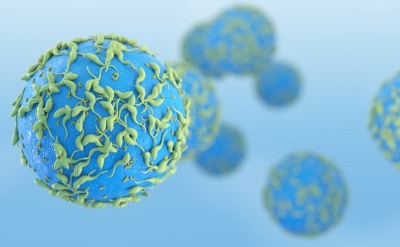Multiple myeloma may be the next frontier for clinical advancement of chimeric antigen receptor T cell therapy (CAR-T therapy) as a treatment for hematologic malignancies, according to a review article published in Clinical Lymphoma, Myeloma & Leukemia.
Due to treatment advancements, the 5-year survival rate for patients with multiple myeloma has risen to 52% over the last decade. The condition, which represents approximately 10% of hematologic malignancies diagnosed in the Western world, is currently treated in the first-line setting with autologous stem cell transplantation, immunomodulatory drugs and proteasome inhibitors.

In the relapsed/refractory setting, treatment often focuses on immunotherapy, such as monoclonal antibodies or donor lymphocyte infusions. After demonstrating success in the treatment of B-cell lymphomas, researchers are striving to adapt CAR-T therapies for patients with relapsed/refractory myeloma.
“CAR-T cells are host cells that are engineered to express an antigen recognition domain that can bind a tumor-specific target,” wrote Shebli Atrash, MD, hematologist, Levine Cancer Institute (Charlotte, NC), and colleagues. “CAR-T receptors are manufactured transmembrane proteins that include antigen recognition domains, connected with a linker, then attached with a hinge to costimulatory domains and T-cell activation domains.”
In their review, Atrash and colleagues outlined CAR-T cell targets for patients with multiple myeloma, as well as potential toxicities associated with the treatment, such as cytokine release syndrome.
The primary CAR-T therapy target for patients with multiple myeloma is the B-cell maturation antigen (BCMA), a part of the tumor-necrosis factor superfamily expressed in B lymphocytes.
“It is a transmembrane protein that is a core component of plasma cell homeostasis and regulates maturation and differentiation of B-cells into plasma cells,” the researchers wrote. “BCMA meets the functional dependency requirement for an optimal target because it is linked to plasma cell survival. … BCMA is nearly universally expressed by all multiple myeloma cells in the majority of patients, though expression level might vary between patients.”
Several other CAR-T targets have emerged in the multiple myeloma setting. These include CS1, also known as SLAMF7, which is expressed BY 95% of patients with myeloma; CD38, which is expressed in all patients with multiple myeloma; CD138, which is also globally present in multiple myeloma cells; and CD56, a glycoprotein expressed in up to 90% of multiple myeloma cases, but whose absence is associated with aggressive disease.
The researchers also provided an overview of nine clinical trials evaluating CAR-T therapy in patients with multiple myeloma. An anti–BCMA CAR-T therapy clinical trial conducted by the National Cancer Institute reported a 100% overall response rate, including one stringent complete response; one patient also experienced myeloma relapse with undetectable BCMA in the bone marrow.
A CAR-T-BCMA study conducted at the University of Pennsylvania and presented at the 2017 ASH Annual Meeting reported that 47% of patients achieved a partial response or better, with responses in four patients lasting between 3+ months and 24+ months. Baseline BCMA expression or serum BCMA concentration were not associated with response in this study.
A separate phase 1 anti–BCMA study reported complete remission in 17 patients, including six patients treated at a dose of 150x106, and 11 patients treated at higher doses. All responding patients were minimal residual disease–negative.
“Despite the promising results, surmounting the toxicity profile of CAR-T cells is essential to their widespread use,” the researchers wrote.
The most common adverse events associated with CAR-T therapy include cytokine release syndrome and other neurotoxicities linked to overactivation of the immune system; pancytopenia caused by conditioning regimens; and post-infusion cases of tumor lysis syndrome or anaphylaxis.
“The CAR-T cells are widely associated with serious but reversible toxicity of cytokine release syndrome,” the researchers wrote. “Two factors contributed to the increased incidence of cytokine release syndrome: first, overactivation of T-cells with the addition of other costimulatory signals in the second or third-generations of CAR-Ts; second, increased cytokine release syndrome seems to be linked with the CAR-T dose in relation to the disease burden.”
Systemic glucocorticoids are used commonly to manage cytokine release syndrome; however, the researchers noted that prolonged exposure may inhibit CAR-T infusion. “With the identification of IL-6 as a core driver of cytokine release syndrome, IL-6 receptor (IL-6R) blockade with anti-IL-6 receptor antibodies such as tocilizumab can effectively mitigate toxicities following infusion of CAR-T cells,” the researchers noted.
Additional directions for CAR-T therapy in multiple myeloma management include “improving costimulatory signals, boosting CAR-Ts by manipulating bone marrow microenvironment, targeting more than one antigen to increase its potency, using CAR-Ts as delivery vehicles for drugs, and searching for newly attractive targets,” according to the authors.
“At this juncture, BCMA is a frontrunner in the target antigen sweepstakes and is perhaps one of the most promising and expression-restricted targets in the world of hematologic malignancies,” they concluded. “Thoughtfully developed CAR constructs that are efficacious and limited in toxicity, in conjunction with a feasible infrastructure for delivery, have the potential to revolutionize the myeloma landscape and lead to lasting remissions.”
